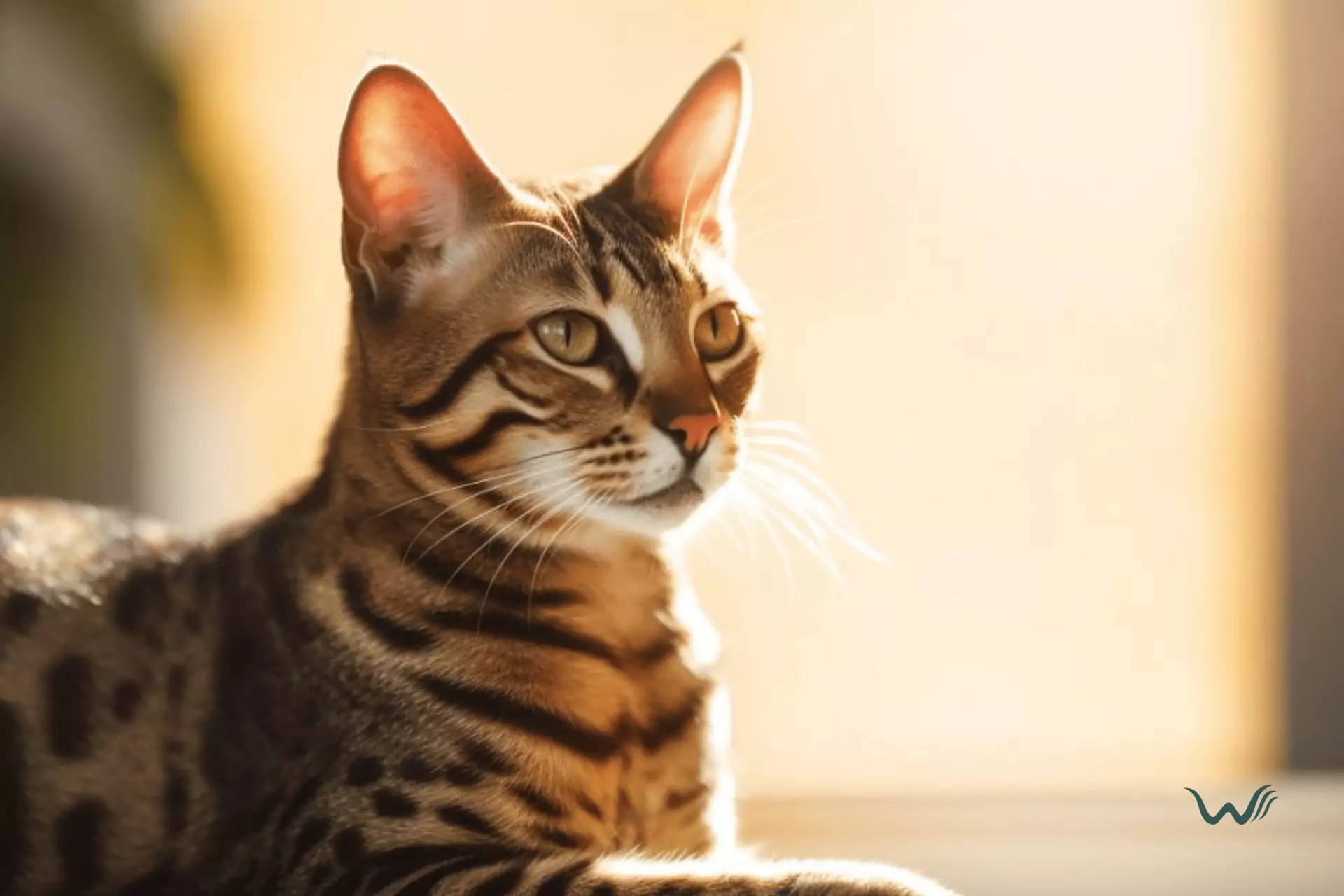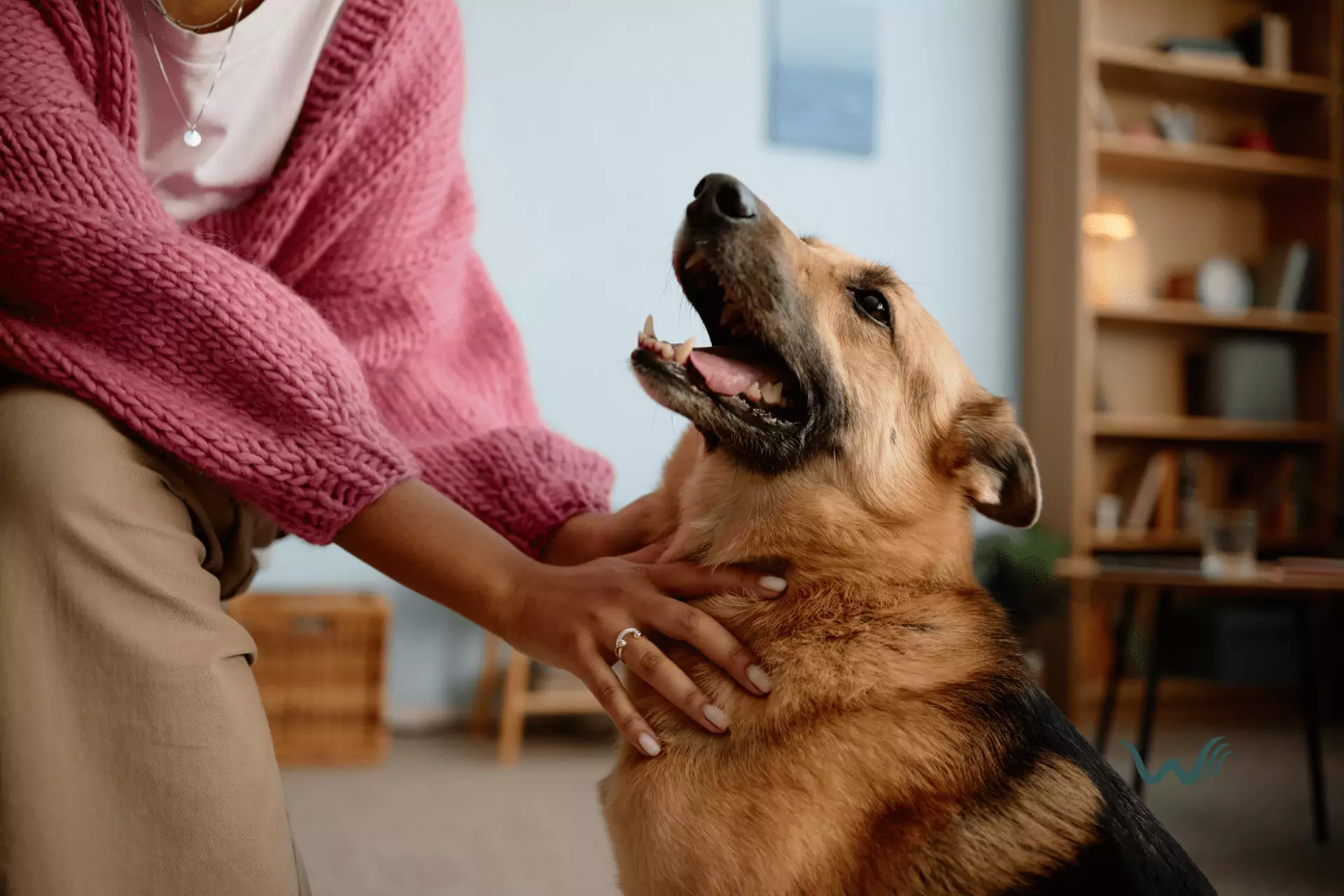

Savannah Cats: The Exotic And Playful Feline Companion
by Tayyaba Amir
Last updated: March 24, 2025
Verified and Approved by:
Angela Morris,
MSW, LCSW
Fact Checked

Are you tired of the same old ordinary house cat? Looking for a feline companion that will truly make a statement? Well, look no further than the Savannah cat! These exotic and playful creatures are the perfect addition to any household. With their stunning appearance and mischievous personalities, they are sure to keep you entertained for hours on end.
Originating from the crossbreeding of a domestic cat and a serval, Savannah cats are a unique and fascinating breed. Their distinctive physical characteristics, such as their long legs, large ears, and beautiful spotted coat, make them stand out from the crowd.
But it’s not just their looks that make them special; their playful and energetic nature is what truly sets them apart. Whether it’s chasing after toys, climbing to new heights, or engaging in a game of hide-and-seek, these cats are always up for some excitement. So, if you’re ready to spice up your life with a touch of the exotic and a whole lot of fun, a Savannah cat is the perfect choice!
Key Takeaways
- Savannah cats are a hybrid breed of domestic cats and servals, known for their exotic appearance and playful nature.
- Some areas have implemented bans or restrictions on owning Savannah cats due to concerns about their potential impact on wildlife populations.
- Potential owners of Savannah cats should familiarize themselves with the legal considerations and ownership restrictions in their area before acquiring one.
- Despite the restrictions, Savannah cats can make excellent feline companions for those who are prepared to provide them with appropriate care and enrichment.
Origins and History of Savannah Cats
Picture this: it’s the 1980s, and a man with a twinkle in his eye named Judee Frank is experimenting with cat breeding. One day, he had a genius idea: what if he could create a cat that looked like a wild African serval, but had the temperament of a domestic cat? And so, the journey of the savannah cat began.
Judee Frank crossed a serval, a sleek and elegant African wildcat, with a domestic cat. And voila! The savannah cat was born. These majestic creatures have the wild markings and long legs of their serval ancestors, but with the friendly and mischievous personality of a domestic cat. It’s like having a mini leopard in your living room, except instead of hunting you down for dinner, it’s more likely to steal your socks and knock over your favorite vase.
The savannah cat quickly gained popularity among cat enthusiasts, and it wasn’t long before breeders all over the world were clamoring to get their hands on these exotic felines. Today, several cat registries recognize them as a breed, and their unique appearance and playful nature continue to captivate cat lovers everywhere.
Physical Characteristics and Appearance
With their sleek and muscular bodies, you can easily spot a Savannah cat from across the room. These cats are like the superheroes of the feline world, ready to pounce and save the day. They have long legs that give them a confident stride, making them look like they’re strutting down a catwalk. And let’s not forget about their stunning coat. Savannah cats have a coat that’s covered in beautiful spots and stripes, like they’re wearing a fashionable leopard print jacket. It’s no wonder they’re the trendsetters of the cat world.
But it’s not just their looks that make them stand out. Savannah cats have a certain charm that is hard to resist. Their ears are large and pointed, giving them a unique and almost comical appearance. It’s like they’re constantly tuned in to the latest gossip and can’t wait to share it with you. And when they’re not busy being the life of the party, they have a way of making you feel like the most important person in the room. With their playful and affectionate nature, Savannah cats are the perfect companion for anyone who wants a little extra excitement in their life.
Temperament and Personality Traits
Imagine having a feline friend who isn’t only incredibly affectionate and sociable, but also ranks as the 4th most popular breed among cat owners worldwide. That’s right, the Savannah cat isn’t your average kitty. These exotic feline companions are known for their playful and mischievous personalities, making them the life of the party. They love to be the center of attention and will go to great lengths to entertain you.
Whether it’s chasing after a feather toy or performing acrobatic feats, the Savannah cat is always ready to show off their impressive athleticism. But don’t let their energetic nature fool you, Savannah cats are also incredibly affectionate. They thrive on human interaction and will happily curl up in your lap for a cozy snuggle session. Their loyalty knows no bounds, and they will follow you around the house, always eager to be by your side. With a Savannah cat in your life, you’ll never have a dull moment. So why settle for an ordinary feline friend when you can have an extraordinary one?
Care and Maintenance of Savannah Cats
Taking proper care of these captivating creatures involves regular grooming and providing a stimulating environment. Savannah cats have a short coat that requires minimal grooming. However, they do shed and may benefit from occasional brushing to remove loose hair. This also helps to prevent hairballs, which no one wants to deal with. So grab your brush and get ready for bonding time with your furry friend!
In addition to grooming, it is important to provide a stimulating environment for your Savannah cat. These cats are highly intelligent and active, so they need plenty of mental and physical stimulation to keep them happy and healthy. Consider providing interactive toys, scratching posts, and puzzle feeders to keep their minds sharp and their bodies active. Plus, it’s always entertaining to watch them pounce on a toy or try to figure out a puzzle. Trust me, you won’t be able to resist laughing at their antics!
Now, let’s take a look at a table that highlights some key aspects of care and maintenance for Savannah cats:
| Aspect | Description | Tips |
|---|---|---|
| Diet | Savannah cats require a high-quality, balanced diet to meet their nutritional needs. | Avoid feeding them a diet that is high in carbohydrates, as this can lead to obesity. Instead, opt for a protein-rich diet that mimics their natural diet in the wild. |
| Litter Box Training | Savannah cats are generally easy to train to use a litter box. | Provide a large litter box with low sides to accommodate their size and ensure it is kept clean to prevent accidents. |
| Exercise | These cats are active and need regular exercise to burn off energy. | Encourage playtime with interactive toys and provide climbing structures for them to explore. |
| Veterinary Care | Regular check-ups with a veterinarian are essential for maintaining your cat’s health. | Stay up to date on vaccinations, flea and tick prevention, and dental care. |
| Safety | Savannah cats are curious and can be prone to getting into mischief. | Make sure your home is cat-proofed by securing windows, keeping toxic plants out of reach, and providing plenty of vertical spaces for them to climb. |
Legal Considerations and Ownership Restrictions
Due to various legal considerations and ownership restrictions, it’s important to be aware of the rules and regulations surrounding the ownership of Savannah cats. While these exotic feline companions can bring joy and excitement into your life, it’s important to understand the responsibilities that come with owning one.
Here are some key points to keep in mind:
- Licensing: Some states and local jurisdictions require specific permits or licenses to own a Savannah cat. Make sure to check with your local authorities to ensure you comply with the law. Remember, it’s better to be safe than sorry when it comes to legal matters and your furry friend.
- Size Restrictions: Savannah cats are known for their large size, with some individuals reaching up to 25 pounds or more. Certain areas may have restrictions on owning such big cats, so make sure to research the regulations in your area. It’s not just about finding enough space for your cat to roam, but also adhering to any size limitations set by local laws.
- Zoning Laws: Before bringing a Savannah cat into your home, check for any zoning laws or restrictions in your area. Some neighborhoods or apartment complexes may have specific rules regarding pet ownership, including the types of animals allowed and any limitations on exotic pets.
- Wildlife Conservation: Savannah cats are a hybrid breed, resulting from the crossbreeding of domestic cats with servals, a wild African cat species. Due to concerns about the impact of hybrid cats on wildlife populations, some areas have banned or restricted the ownership of Savannah cats. It’s important to respect these regulations and consider the potential ecological consequences of owning such a unique and exotic pet.
Owning a Savannah cat comes with responsibilities beyond just providing love and care. By familiarizing yourself with the legal considerations and ownership restrictions, you can ensure a harmonious and legal relationship with your feline companion.
Frequently Asked Questions
Are Savannah cats prone to any specific health issues?
Oh, the majestic Savannah cat! While they’re generally healthy, like any feline friend, they can be prone to a few issues. But fear not! These playful beauties are worth every perfect moment.
Can Savannah cats be trained to use a litter box?
Of course, you can train a Savannah cat to use a litter box! These clever little beasts are quick learners, so just show them where it is and they’ll be doing their business in no time. No more surprises for you!
How much exercise do Savannah cats need on a daily basis?
To keep your Savannah cat happy and healthy, make sure they get their daily dose of exercise. It’s like giving them an adrenaline-infused rollercoaster ride through the jungle, but in your living room.
Do Savannah cats get along well with other pets, such as dogs or other cats?
Savannah cats can get along well with other pets, like dogs or cats. They’re not just exotic, they’re also social butterflies! So go ahead and introduce them to your furry friends, and let the fun (and chaos) begin!
What kind of diet is recommended for Savannah cats?
For a healthy and happy Savannah cat, it’s important to provide a balanced diet of high-quality cat food. Think of it like a gourmet meal fit for royalty, because that’s what your majestic feline deserves!
Certify Your Emotional Support Animal Today

Why You Can Rely on Us?
At Wellness Wag, we believe your pet deserves care rooted in both science and compassion. Each article is carefully researched, written in clear language for pet owners, and then reviewed by qualified professionals to ensure the information is evidence-based, current, and practical for real-life care. Our goal is to help you feel confident in making informed decisions about your pet’s health and well-being.
Reviewed by
Angela Morris, MSW, LCSW
Angela is a licensed clinical social worker with 20 years of experience in patient advocacy and community mental health. She has assisted numerous clients with ESA evaluations and brings a deep understanding of disability accommodations, ensuring that all information is accurate, supportive, and practical.

Written by :
Tayyaba Amir
Last Updated :
March 24, 2025












